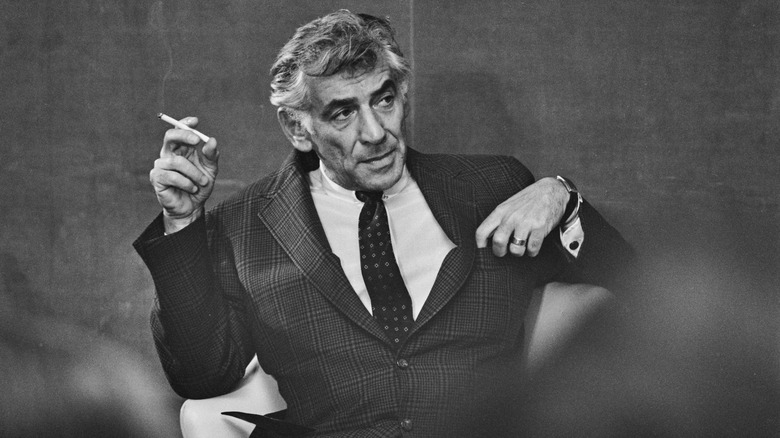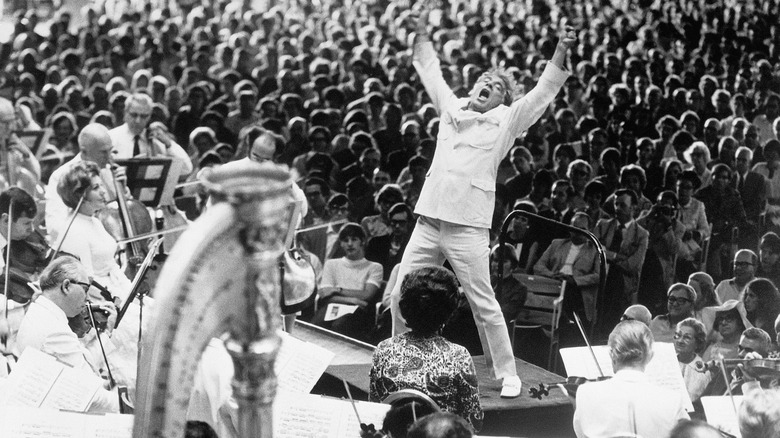Why Leonard Bernstein Was A Person Of Interest For The FBI
Wanted: Beloved pianist, composer, conductor, and hardened anti-American deviant. He is "connected, affiliated, or in some manner associated with" the following freedom-hating groups that serve to undermine the values of our great nation and promote the democracy-annihilating evils of communism: Civil Rights Congress, Council on African Affairs, Joint Anti-Fascist Refugee Committee, American Youth for Democracy, and many more such insidious societal poisons. Born 1918, lives in Manhattan, is male and white, and goes by several aliases: Lenord Berstein, Leo Bernstein, and Leonard Bernstine. Also really likes cigarettes.
Thankfully, F.B.I. director J. Edgar Hoover recognized this persecutory angle as rubbish the first time Leonard Bernstein crossed his desk as a person of interest in a 1949 memo, per The New Yorker. Hoover, regarding the "connected, affiliated" line, wrote, "This phraseology means nothing + most certainly I can't send to W. H. [the White House] such ambiguous + sweeping statements."
And what kind of person of interest was Bernstein supposed to be, exactly? At that point in his career, he'd already been Music Director of the New York City Symphony Orchestra for two years from 1945 to 1947, conducted across the world in places like London, Prague, and Tel Aviv, and produced two of his major works: 1943's "Symphony No. 1" and 1949's "Symphony No. 2." And in an age of frothing paranoia and feverish McCarthyism, he was also considered a possible enemy of the state.
The height of the Red Scare
Ultimately, there's one reason why Leonard Bernstein transformed from a front-page musical sensation to the subject of an 800-page FBI dossier: McCarthyism, aka the "Red Scare." The Red Scare was a truly bizarre and terrifying chapter of United States history roughly sandwiched between the end of World War II (1945) and the onset of the space race between the U.S. and USSR (1955), although History says things lingered until the late '50s.
Right when the U.S. was propping itself up into a position of global, military-enforced dominance, it came to head-to-head with a rival that it needed to demonize through all propagandistic measures possible: the Soviet Union. This period overlapped with other politically-motivated, communism-abutting U.S. incursions into foreign soil in the form of the Korean War (1950 to 1953) and the Vietnam War (1954 to 1975). And so it was that "communism" became the new "Hitlerism," as another FBI memo wrote of Bernstein in 1952, per The New Yorker. The U.S. government — spurred on by the "shrieking denunciations and fear-mongering" of Senator Joe McCarthy of Wisconsin," per the University of Virginia's Miller Center — tracked and persecuted its own citizens and brought anyone considered an internal threat to the country's stability under the proverbial knife.
So it was that the FBI tracked Leonard Bernstein for decades. Even as late as 1970 Bernstein, a Jew of Ukrainian heritage, was suspected of every calumnious buzzword under the sun, including expressing "anti-Zionist and pro-Arab statements," as The New Yorker shows.
Vague accusations and the power of Mass
As for what Leonard Bernstein actually did to incur the suspicions of the FBI, it's all absolutely vague and hard to define. In 1958, for instance, The New Yorker reports that an informant wrote to the FBI, "I know that Bernstein is a card-carrying Communist but I have no proof of it but I can tell by the way he talks." And even though J. Edgar Hoover dismissed initial suspicions about Bernstein's red-leaning ways, he eventually got on board the hunt once the composer made friends with the Black Panthers. Per The New Yorker, Hoover in 1968 called the aggressive, Black nationalist organization "the greatest threat to the internal security of the country." Bernstein hosted a fundraiser for the group in 1970.
A year later in 1971, Bernstein released "Mass," a highly stylized and musically eclectic piece that the Leonard Bernstein website says "challenges divine authority, exposing its contradictions and questioning religion's relevance to contemporary life" and "ultimately serves as a reaffirmation of faith and hope for universal peace." Per The New Yorker, the FBI urged the White House to "steer clear of 'Mass' at all costs," as the piece was intended to "embarrass the United States government." As The New Yorker also writes here and here, "Mass" caused quite the stir within the Nixon administration but ultimately resulted in nothing more than a freakishly tangled mess of name-calling and fruitless paranoia. There's little mention of Bernstein in FBI records after this point.


